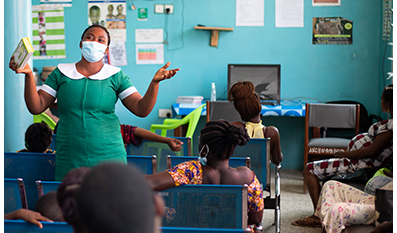Researchers transform maternity care in Ghana
November/ December 2021 | Volume 20 Number 6
 Photo by Emmanuel Attramah/PMIA Fogarty-funded project is studying ways to provide women with more respectful care during childbirth in Ghana.
Photo by Emmanuel Attramah/PMIA Fogarty-funded project is studying ways to provide women with more respectful care during childbirth in Ghana.
Women often report both physical and psychological abuse while delivering babies in low- and middle-income country (LMIC) health care facilities. Mistreatment may include being examined without consent, discriminated against based on social status, denied a choice of birthing position, detained for non-payment or being subjected to unconsented procedures. “Abuse has become part and parcel of the practice,” said Dr. Veronica Dzomeku, who is using an Emerging Global Leader Award to try to transform the culture of disrespectful maternity care in Ghana. The Fogarty program provides an intensive, mentored research experience that is intended to lead to an independently funded research career.
Dzomeku’s five-year award is supporting her work developing and testing a midwife training program to change the culture of disrespect and abuse in childbirth care in a 1,200-bed hospital in Kumasi. A senior lecturer at the Kwame Nkrumah University of Science and Technology, Dzomeku began by quantifying and characterizing healthcare facility disrespect and abuse. A midwife, for example, may hit or scream at a woman who is not pushing enough. “Our studies show the midwives have life-saving intentions. So it is not as if they intend to abuse clients—it’s the only way they know how to ensure compliance and save the lives of mother and baby,” Dzomeku explained.
Ghana’s maternal mortality rate has been cut by half since 1990, in large part due to an increase in facility based deliveries. This success rate could easily stagnate— or reverse—if disrespectful and abusive maternal care continues and results in more home births, Dzomeku said. “Times have changed. What used to be accepted as normal no longer is,” she added. The negative impacts of disrespect are both direct and indirect. Abuse during labor and delivery may directly result in the death of mother or baby, while some women who hear about mistreatment choose to deliver at home, indirectly placing lives at risk if complications occur.
Dzomeku’s intervention consists of a four-day Respectful Maternity Care training program with modules encouraging respect and dignity during childbirth, appropriate communication, focused antenatal care and alternative birthing positions. The program embraces interactive teaching and learning methods such as role-play, discussion, brainstorming, demonstrations and case studies. Importantly, the antenatal care module brings mothers in the same trimester together for group sessions, which not only helps overscheduled midwives but also benefits mothers by providing an opportunity to learn from their peers.
Following the training, Dzomeku’s team conducted detailed interviews with 14 midwives. The participants reported their newly acquired knowledge had positively improved their relationship with childbearing women, helped them communicate more effectively and recognize the autonomy of their patients during delivery. Some of the midwives also noted that the hospital’s policies and built environment pose barriers to improving some aspects of care. For instance, they were not able to support alternative birthing positions or ensure privacy for multiple childbearing women in the open labor ward. The midwives recommended that logistics be improved and that all staff be provided with the training.
“We’ve also developed a tool for measuring postpartum experiences,” noted Dzomeku. “Women have reported increased satisfaction with the care they received from our trained midwives.”
The project’s first trainees, referred to as “ambassadors of respectful maternity care,” have now begun to train others. “When midwives who are not yet trained have challenges, they ask for an ambassador to be called in,” explained Dzomeku. Since the issue is widespread, Dzomeku plans to scale up use of the intervention first within Ghana and then beyond its borders.
Mothers are not alone in reaping rewards. Trained midwives said the program provided them with valuable tools. “The training has helped me in managing my clients very well,” one study participant said. “Now, I regret the abuse. Now I give them answers. I do not hit them. I talk to them. The training workshop has changed me forever.”
More Information
- Fogarty grant:
Changing the Culture of Disrespect and Abuse in Maternity Care in Kumasi, Ghana
- Emerging Global Leader Award program
-
“I wouldn’t have hit you, but you would have killed your baby:” exploring midwives’ perspectives on disrespect and abusive Care in Ghana, BMC Pregnancy and Childbirth via PubMed, January 6, 2020
-
Midwives’ experiences of implementing respectful maternity care knowledge in daily maternity care practices after participating in a four-day RMC training, BMC Nursing via PubMed, March 10, 2021
-
Exploring midwives’ understanding of respectful maternal care in Kumasi, Ghana: Qualitative inquiry, PLOS ONE via PubMed, July 9, 2020
To view Adobe PDF files,
download current, free accessible plug-ins from Adobe's website.
Related Fogarty Programs
Related World Regions / Countries
Related Global Health Research Topics